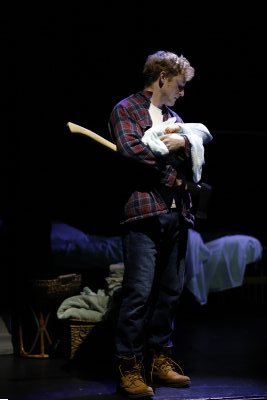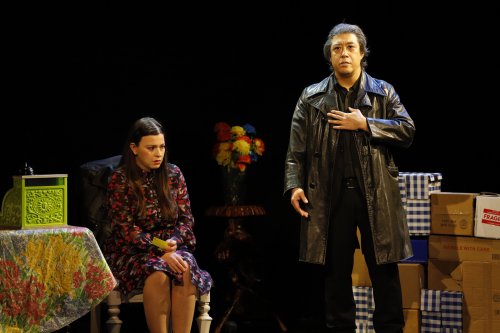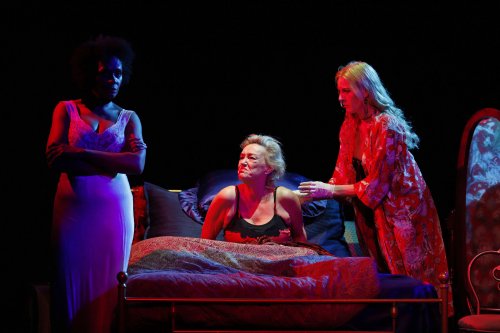Merciful Delusions : 4 One Act Plays by Tennessee Williams
Four exceptional one-act plays by Tennessee Williams, two that go as far back as 1939 when they were awarded a $100 prize by the legendary Group Theatre.
[avatar user=”Tony Marinelli” size=”96″ align=”left”] Tony Marinelli, Critic[/avatar]

Joey Welsh in a scene from “Moony’s Kid Don’t Cry,” part of “Merciful Delusions: 4 One Act Plays by Tennessee Williams” at Theatre Row Theatres (Photo credit: Andrew Mauney)
The Group Theatre was a collective of theatre professionals Harold Clurman, Cheryl Crawford and Lee Strasberg formed in 1931 with New York City as a base for its naturalistic and highly disciplined artistry. In 1939 a young playwright named Tennessee Williams submitted three one-act plays to a Group Theatre competition. He was awarded $100 and caught the attention of literary agent Audrey Wood, influential in the careers of several of the most recognized dramatic playwrights of the mid-20th century, amongst them Williams, William Inge, Arthur Kopit and Robert Anderson. Two of those three plays are being seen in a collection of four seldom produced one-acts entitled Merciful Delusions.
The Case of the Crushed Petunias, one of the two plays from 1939, is a slight piece, but deceptively so. The setting is Ms. Simple’s Notion Shop in Primanproper, MA, where a woman in her mid-20s has barricaded her small business with two rows of hearty petunias which have been deliberately trampled the night before. Primanproper must really be a small town as she brings the shoe store owner to measure the heel prints and has determined the villain is someone not from the town because the particular size is not worn by anyone in living there. She attempts to file a police complaint, but the officer can’t easily start investigating in another town.

Martin Riofrio and Michelle Oppedisano in a scene from “The Case of the Crushed Petunias,” part of “Merciful Delusions: 4 One Act Plays by Tennessee Williams” at Theatre Row Theatres (Photo credit: Andrew Mauney)
As luck would have it, the villain walks in the store to purchase socks he sees in the window. Ms. Simple has what we would call now “way too much time on her hands” as she prods him to explain why he did such a vile deed. He says it was to force her to break from her confining existence. As everything must be “just so” she reveals herself way too agreeable, patient and unbearably naïve in his company. She is so inexperienced in her own town she agrees to meet him later after the store closes on a highway that is no longer passable. When the officer attempts to dissuade her, her curiosity about the young stranger is piqued even more. The young man speaks to her of the “miraculous accident of being alive” in a barrage of poetry, seeds for wild roses as a substitute for her petunias, and a business card promoting his company, Life Inc.
Michelle Oppedisano has the unenviable task of making her behavior as Ms. Simple believable. Given the play was written over 80 years ago and etiquette was very different, a Ms. Simple in 2022 would aim her pepper spray at him and keep walking. Ms. Oppedisano does fall into the trap of high pitched whining, but not like a contemporary “Karen” because a “Karen” would never give in. The young man, played by Martin Riofrio, delivers so many of his key points as blank stentorian and pitched to audience members in the last row. Where the role could be played as arousing and suggestive to be persuasive, unfortunately the role is played so smug, Ms. Simple could not possibly be that desperate she agrees to a rendezvous with him. JR Carter is effective in the small role of the officer. The officer placates the woman, clearly as this has happened before. Elizabeth Bove as Mrs. Dull, (DULL – get it?) is a consummate Ms. Simple in about forty years – officious, demanding and persnickety.

Josh Freed and Aurore Quintard in “The Lady of Larkpsur Lotion,” part of of “Merciful Delusions: 4 One Act Plays by Tennessee Williams” at Theatre Row Theatres (Photo credit: Andrew Mauney)
Mrs. Hardwicke-Moore, The Lady of Lockspur Lotion, is a studied precursor to Blanche DuBois in A Streetcar Named Desire. The play is set in a New Orleans flophouse in the 1940’s, with the lady being very down on her luck. Fewer customers (“johns”) means she is unable to pay her rent. She has convinced herself she is an heiress to a Brazilian rubber plantation and she is waiting for her quarterly payments to be deposited into her account. To temporarily fend off the landlady she complains about a deluge of flying cockroaches in her room. As the argument gets louder, another deadbeat renter, Mr. Chekhov, comes to her aid – a slovenly alcoholic who just happens to have a 780-page masterpiece ready to be published laying in his room. Mrs. Bove, the landlady, while perfectly within her rights to collect rent, she realizes trying to do it at this very moment will be a waste of her time.
Aurore Quintard as Mrs. Hardwicke-Moore gives a very detailed and poignant account of a woman who may have once had class and wealth, but is truly desperate now. Elizabeth Bove as Mrs. Wire is appropriately gruff as the landlady who strikes out at collecting what she is due. Josh Freed as Chekhov is very confident as an unpublished writer who is waiting for that big break. His touching scene with Quintard at the end reveals the type of good guy he would be if he did get that break: not a con man anymore, but someone who can help those less well off.

Joey Walsh and Natalie Neckyfarow in a scene from “Mooney Kid Don’t Cry,” part of “Merciful Delusions: 4 One Act Plays by Tennessee Williams” at Theatre Row Theatres (Photo credit: Andrew Mauney)
Moony’s Kid Don’t Cry, the other play here from the 1939 competition, is a two-hander for a very young couple set in a cheap flat in a large American industrial city. They are married because she got pregnant. Jane had a very good job, with a boss that would buy her fur and perfume. Ten months into her marriage she is very dissatisfied with her married life, she thinks her husband is an imbecile, and she is not enjoying being a mother. Moony feels equally taken advantage of, is unhappy with his prospects at work, and is made to feel inadequate as a husband and father. He does have the “wanderlust” and doesn’t have a problem seeing the country from a boxcar on Christmas morning, as that is what his father did when Moony was a boy.
Natalie Neckyfarow as Jane is someone who has known success and some degree of never wanting for anything. She yearns for the innocent happiness she once had and unknowingly threw away. She resents Moony for wanting things she has no interest in. Joey Welsh as Moony is a revelation. He takes snide remarks from his boss and co-workers, and emotional abuse from his wife because he is not a success and in her eyes never will be. He had no father figure growing up, at least not one that stayed long enough to raise him and not knowing how to interact with his own one-month old son is a sad missed opportunity. “I look at things different,” indicates an imagination too large for the stage. When he threatens to leave, but Jane beats him to it, we see that he understands responsibility and has enough love for his young son to be up to the challenge of raising him alone if he has to.

Marie-Claire Giraud, Nicole Gut and Elena Clark in a scene from “Hello from Bertha,” part of “Merciful Delusions: 4 One Act Plays by Tennessee Williams” at Theatre Row Theatres (Photo credit: Andrew Mauney)
Hello from Bertha shows us another whore at the end of her rope, and at the end of her life as she knows it. The play has devices to point to A Streetcar Named Desire, such as a man that was always there to help her when she was in need, but time and her desperate situation now has made them grow apart. Now bedridden, she is unable to provide for herself and is in danger of being removed from the brothel utterly broke. She suffers delirious episodes, accusing her floormates of stealing from her. The final moment, dictating a letter, signing off with all her love is so very haunting…at one point in her life, she had love. Like Blanche DuBois, she must leave the place she has lived in and go somewhere where she can be taken care of. Nicole Gut as Bertha is painfully sad – an exercise in solo tragedy. The Goldie of Marie-Claire Giraud is a manual of caring and the gentlest essay in tough love one can hope for. Elena Clark in the brief role of Lena is all knowing in the realization that Bertha could be her someday. The pimp of JR Carter is anachronistic looking more like a character from a 70’s Blaxploitation film than a “businessman” in the 1940’s.
Director Lorraine Serabian is faithful to the spirit of when these plays were written. She delves into the spirited dreamers and chance takers that Tennessee Williams so faithfully showed us in very poetic theatre of the rawest psychological insight. The scenic design of JR Carter is economical for fast changes between plays, yet evocative of the period it is asked to enhance. Adrian Yuen’s lighting design captures the dinginess and the squalor, yet always craving that sliver of brightness.
Williams wrote more one-act treasures than we see here, and this production definitely makes an audience want to experience more of his minor masterpieces.
Merciful Delusions: 4 One Act Plays by Tennessee Williams (through November 12, 2022)
Theatre Row Theatres
410 West 42nd Street, in Manhattan
For tickets, visit http://www.bfany.org/theatre-row/shows/merciful-delusions
Running time: two hours including one intermission






Leave a comment